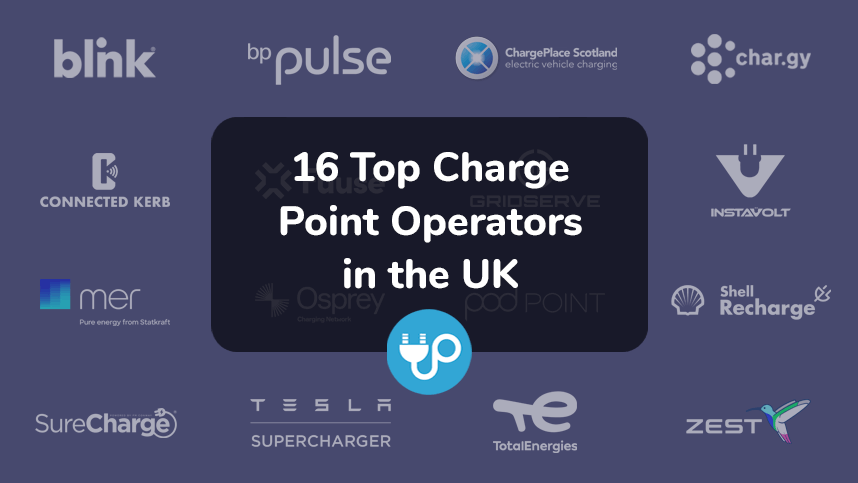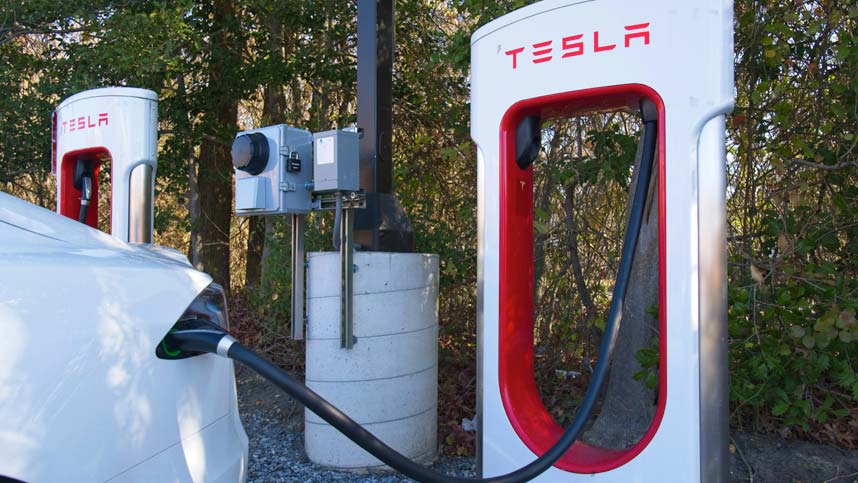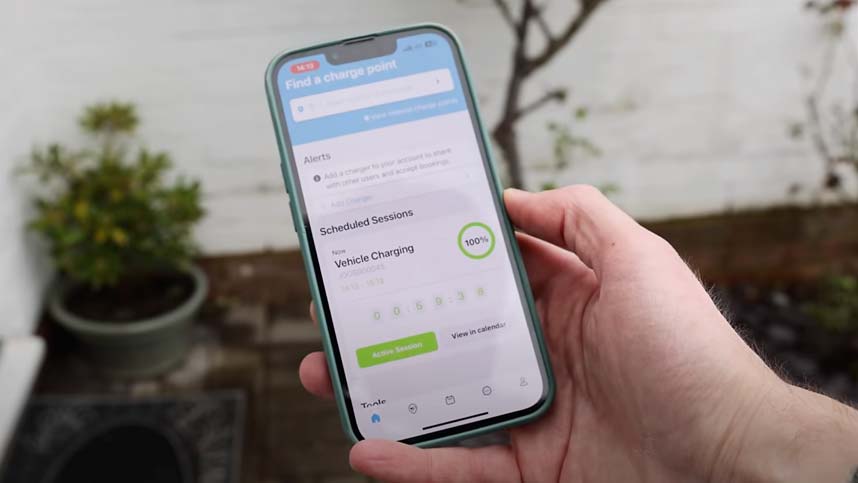
16 Top Charge Point Operators in the UK
A Charge Point Operator (CPO) is a company or organisation that installs, manages and maintains electric vehicle (EV) charging infrastructure.
They are the backbone of the public EV charging network, ensuring that charge points are operational, safe, and accessible.
While some CPOs also develop software or apps, their primary focus is on delivering physical charging stations to homes, businesses, public spaces, and roadside locations.
In the UK especially, the CPO landscape is rapidly growing to meet the rising demand for EV infrastructure.
Chapters
Roles & Responsibilities of Charge Point Operators
Develop Infrastructure
CPOs play a vital role in expanding EV charging networks by identifying optimal locations for new charge points based on traffic data, local demand, and power availability.
This involves partnerships with local councils, landowners, supermarkets, and private businesses.
Hardware Installation & Maintenance
From installing slow on-street chargers to high-speed motorway rapid units, CPOs are responsible for sourcing, deploying and maintaining reliable charging hardware.
Regular servicing and prompt repairs are critical to avoid charger downtime.
Network Management
Operators must ensure that each charging point is networked into their central system for real-time monitoring, diagnostics, updates and availability tracking.
Backend Management
Behind every charging session lies a system that handles user authentication, payment processing, charging session tracking, and energy usage analysis.
CPOs manage this backend infrastructure.
Operational Monitoring
Using smart software tools, CPOs constantly monitor their networks for outages, faults, or usage spikes.
This ensures swift resolution of any issues to maintain service reliability.
Customer Support
When EV drivers face issues at charge points, from payment failures to technical faults, it’s the CPO who provides remote assistance via helplines, apps, or customer service platforms.
Data Management & Reporting
CPOs generate large volumes of data, from user behaviour to energy usage.
This data is used for performance insights, infrastructure planning, and sharing with stakeholders such as local authorities.
Marketing
Many CPOs promote their network via mobile apps, maps, and partnerships with vehicle manufacturers and fleet providers.
Visibility and branding help attract more users to their network.
Safety & Security
CPOs must adhere to rigorous safety standards to ensure their equipment is electrically safe and secure against tampering or vandalism.
User privacy and secure data handling are also vital.
What Regulatory Compliance Must Charge Point Operators Follow?
In the UK, charge point operators must comply with a range of government regulations:
OZEV Regulations
Infrastructure installed using government grants must meet the Office for Zero Emission Vehicles’ criteria.
Smart Charging Regulations
From July 2022, new home and workplace chargers must include smart features that help balance grid demand.
Accessibility Standards
Charge points must meet BSI PAS 1899 standards for inclusive design, including wheelchair access.
Transparent Pricing
As of 2023, all public charge point operators must display prices clearly and offer contactless payment on new rapid chargers.
Who are the Main Charge Point Operators in the UK?
Below is a rundown of the top 16 CPOs, including their typical pricing and key features.
1. Blink
Blink is a newer entrant in the UK, focusing on workplace and public destination charging. Their pricing typically starts at around 45p/kWh for fast charging.
2. BP Pulse
One of the largest UK networks, BP Pulse offers slow (7kW), fast (22kW) and rapid (50kW+) chargers. Prices range from 44p/kWh (members) to 69p/kWh (pay-as-you-go).
3. Char.gy
Char.gy specialises in lamppost-mounted on-street chargers. These slow chargers (up to 7kW) cost approximately 40-50p/kWh, ideal for overnight charging.
4. ChargePlace Scotland
Funded by the Scottish Government, this network offers a mix of slow to rapid chargers. Many are free to use, though some sites charge around 30-45p/kWh.
5. Connected Kerb
Connected Kerb are known for their discrete, long-life chargers ideal for kerbside use. Typically slow (5.5 to 7kW) with rates between 35p and 45p/kWh.
6. Fuuse
Fuuse provides white-label charging software and hardware across the UK. Pricing varies by host but often ranges between 40p and 60p/kWh.
7. GRIDSERVE
A premium rapid and ultra-rapid charging network found mainly on motorways. Gridserve charges are typically 69p/kWh for rapid charging and up to 85p/kWh for ultra-rapid.
8. InstaVolt
Popular for reliability and ease of use, InstaVolt has 50kW+ chargers priced at 85p/kWh. Known for strong uptime and contactless payment.
9. Mer
Owned by Statkraft, Mer provides a mix of fast and rapid chargers in cities and business locations. Rates vary from 45p to 75p/kWh.
10. Osprey Charging
Focused on convenience retail and urban hubs, Osprey charges 79p/kWh across its rapid and ultra-rapid network.
11. Pod Point
Installed widely at supermarkets like Tesco, Pod Point offers free 7kW charging in some locations, otherwise around 44-55p/kWh.
12. Shell Recharge (Ubitricity)
Shell Recharge includes Shell’s forecourt chargers and Ubitricity lamppost units. Prices range from 45p to 79p/kWh depending on location and speed.
13. Sure Charge
The Sure Charge network offers slow to fast public and private chargers across towns and housing estates. Pricing typically ranges from 38p to 58p/kWh.
14. Tesla Supercharger
Exclusive to Tesla users initially but now open to other brands in select locations. The Tesla Supercharger network offers charging speeds up to 250kW, priced at 60-77p/kWh.
15. Total Energies
Emerging in the UK with a growing footprint. Total Energies rapid chargers range from 65p to 80p/kWh, with investments focusing on renewably powered stations.
16. Zest
Funded by the UK Infrastructure Bank, Zest is deploying public EV charging in under-served areas. Pricing averages 45-60p/kWh.
What are the Alternatives to Charge Point Operators (CPOs)?
Home Charging
For most EV drivers with off-street parking, home charging is the most affordable and convenient option.
Installing a home charge point typically costs around £800-£1000, and electricity tariffs like Octopus Go can bring charging costs down to just 7.5p/kWh overnight.
EV Charger Sharing
For those without driveways or access to private chargers, EV charger sharing apps such as Joosup offer a cost-effective and community-led alternative.
Available for both Apple and Android devices, Joosup connects EV owners with nearby home or business chargers, often available for a fraction of the price of public rapid networks.
Charger sharing reduces strain on public infrastructure, supports local communities, and provides more charging options in densely populated urban areas.
As public charging prices soar due to high energy costs and infrastructure investments, charger sharing schemes like Joosup are proving to be a practical solution for base charging, especially in towns and cities.
Conclusion
Charge Point Operators are central to the UK’s EV transition, offering a range of public and commercial charging solutions.
Each CPO differs in speed, cost, availability, and reliability, making it important for drivers to understand their options.
Yet, as the EV market matures and energy prices remain volatile, alternatives such as Joosup’s charger sharing platform are emerging as smart, affordable complements to traditional CPOs.
Whether charging at home, in public, or through a neighbour’s driveway, the UK’s growing ecosystem ensures there’s a charging solution for every driver.
Blog Archive
- What is a CT Clamp and Does My Charger Need One?
- Is Using an EV Granny Charger Safe?
- Charge Rage: Is It Really a Thing?
- Vehicle to Load (V2L): What It Is & How It Works
- 16 Top Charge Point Operators in the UK
- 8 Types of EV Battery Explained
- Where Can I Charge My Electric Car?
- Electric Car Maintenance and Servicing Guide
- How Often Should I Charge My Electric Car?
- How to Check EV Battery Health
- Do Electric Cars Pay Road Tax?
- October 2024 Budget: Key EV News
- EV vs ICE – Which is Best?
- Should I Charge My EV to 80 or 90 or 100%?
- UK Government Announces Hybrid Sales Allowed Until 2035
- BEV vs PHEV – What’s the Difference?
- Definitely Not A Guru (Jim Starling) Reviews Joosup
- How Long Do Electric Car Batteries Last?
- 25 New Electric Car Brands on UK Roads
- General Election 2024: Major Party Net Zero Policies Compared



















